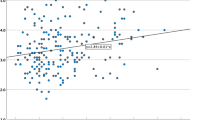Abstract
Two studies were conducted in order to reconcile contextualist accounts of self-efficacy with recent evidence supporting its global nature. A correlational analysis (Study 1) indicated that Tipton and Worthington’s (1984) Generalized Self-Efficacy (GSE) Scale was inversely related to Rotter’s Internal-External Locus of Control Scale and Beck’s Hopelessness Scale. In contrast, no discernible pattern of intercorrelations was obtained across six task-specific tests of self-efficacy. A single bipolar factor emerged, however, when the GSE Scale was factor analyzed with task-specific ratings of self-efficacy. Study 2 demonstrated that task-specific, but not GSE scores, were sensitive to actual performance on cognitive tasks. These results were interpreted as evidence for the hypothesis that global and task-specific measures assess relatively distinct aspects of the construct of self-efficacy.
Similar content being viewed by others
References
BANDURA, A. (1977). Self-efficacy: Toward a unified theory of behavioral change. Psychological Review, 84, 191–215.
BANDUARA, A. (1981). Self-referent thought: A developmental analysis of self-efficacy. In J. H. Flavell & L. Ross (Eds.), Social cognitive development: Frontiers and possible futures. Cambridge: Cambridge University Press.
BANDURA, A. (1982). Self-efficacy mechanism in human agency. American Psychologist, 37, 122–147.
BANDURA, A., ADAMS, N. E., HARDY, A. B., & HOWELLS, G. N. (1980). Tests of the generality of self-efficacy theory. Cognitive Theory and Research, 4, 39–66.
BANDURA, A., & SCHUNK, D. (1981). Cultivating competence, self-efficacy, and intrinsic interest through proximal self-motivation. Journal of Personality and Social Psychology 41, 586–598.
BECK, A. T., WEISSMAN, A., LESTER, D., & TREXLER, L. (1974). The measurement of pessimism: The hopelessness scale. Journal of Consulting and Clinical Psychology, 42, 861–865.
FIBEL, B., & HALE, W. (1978). The Generalized Expectancy for Success Scale: A new measure. Journal of Consulting and Clinical Psychology, 46, 924–931.
FLAVELL, J. H. (1979). Metacognition and cognitive monitoring: A new area of cognitive-developmental inquiry. American Psychologist, 34, 906–911.
FOGG, M. E., KOHAUT, S. M., & GAYTON, W. F. (1977). Hopelessness and locus of control. Psychological Reports, 40, 1070.
KERLINGER, F. N. (1973). Foundations of behavioral research (2nd ed.). New York: Holt, Rinehart & Winston.
LEFCOURT, H. M. (1976). Locus of control: Current trends in theory and research. New Jersey: Erlbaum.
MADDUX, J., SHERER, M., & ROGERS, R. (1982). Self-efficacy expectations and outcome expectations: Their relationship and their effects on behavioral intentions. Cognitive Therapy and Research, 6, 207–211.
NEWMAN, J. M. (1977). Comparison of the l-E Scale and a specific locus of control measure in predicting risk-taking behavior under novel task conditions. Psychological Reports, 40, 1035–1040.
ROTTER, J. B. (1966). Generalized expectations of internal versus external control of reinforcement. Psychological Monographs, 80, 609.
SCHUNK, D. H. (1981). Modeling and attributional effects on children’s achievement: A self-efficacy analysis. Journal of Educational Psychology, 73, 93–105.
SCHUNK, D. H. (1982). Effects of effort attributional feedback on children’s perceived self-efficacy and achievement. Journal of Educational Psychology, 74, 548–556.
SCHUNK, D. H. (1983). Developing children’s self-efficacy and skills: The roles of social comparative information and goal setting. Journal of Comparative Social Psychology, 75, 511–518.
SCHUNK, D. H. (1984). Self-efficacy perspective on achievement behavior. Educational Psychologist, 19, 48–58.
TIPTON, R., & WORTHINGTON, L. (1984). The measurement of generalized self-efficacy: A study of construct validity. Journal of Personality Assessment, 48, 545–548.
WANG, A. Y, & RICHARDE, R. S. (1987). Development of memory-monitoring and self-efficacy in children. Psychological Reports, 60, 647–658.
Author information
Authors and Affiliations
Rights and permissions
About this article
Cite this article
Wang, A.Y., Richarde, R.S. Global Versus Task-Specific Measures of Self-Efficacy. Psychol Rec 38, 533–541 (1988). https://doi.org/10.1007/BF03395045
Published:
Issue Date:
DOI: https://doi.org/10.1007/BF03395045




